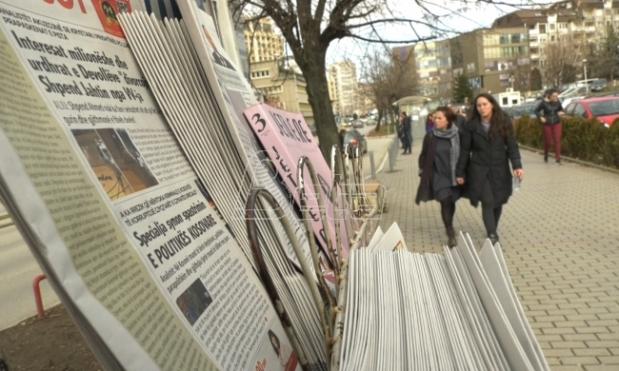
“This is news which has specific goals, mostly aiming to discredit or compromise business or political rivals. Such items are made in specific periods and this is what makes them different from ‘regular’ fake news. The latter is produced thanks to advanced technology by people in high positions. They use propaganda and are well acquainted with the public’s psychology. They know how the people will react to certain issues and target the ‘weak’ spots, and this allows them to produce the desired effect,” says Pacarizi.
Agron Bajrami, editor in chief of the Koha Ditore daily newspaper and a member of the Council for Print Media’s board, says that as of recently the number of complaints from individuals claiming that the reports on them released in the media were false has gone up. He adds that many of them do not realize that these actually are not always deliberate distortions meant to cause damage or spread propaganda.
“In Kosovo, such news is usually not invented but is the result of serious professional shortcomings. Most of it is not fake news, but news violating the journalistic code of ethics because of carelessness, lack of knowledge, and similar,” Bajrami explains.
According to him, fake news existed much before the term was coined, but was then called “propaganda,” while today it can easily be concluded that such news is produced by people usually coming from institutions, who want to profit from it financially or politically.
Faik Ispahiu agrees with this conclusion. He is director of the Internews Kosova non-government organization dealing with the development of news media and investigative journalism in Kosovo, which also runs the Kallxo.com news portal.
“Unfortunately, we have had plenty of opportunities to see prime ministers, parliament speakers, presidents, corporation and major company owners directly financing such ‘presstitutes’. They found news media whose main purpose is to smokescreen the untruths they disseminate and stifle the truth,” Ispahiu emphasizes.
He calls such media “instant” media; they are founded for a specific purpose – to launch a campaign or spread propaganda, and after they accomplish their task, they “go bankrupt.”
“Unfortunately, most of these ‘instant’ outlets are financed by the state through funds certain ministries have at their disposal to promote their activities, or through public companies such as the Postal Service and others, which are allowed to found media outlets,” Ispahiu adds.
In view of the fact that today any citizen can create a webpage of his own where he can post various unconfirmed news and which, depending on the political or economic interest, can be further spread by other portals, it is clear that the speed by which misinformation can be spread is enormous and can strongly influence the public opinion.
“Such outlets and their ‘instant’ journalists usually emerge ahead of an election, but also whenever is deemed necessary – when a topic should be invented and imposed or some other has to be covered up or marginalized, i.e. when times are difficult as is currently the case,” Ispahiu says.
There are hundreds of webpages and portals in Kosovo whose owners are mostly unknown, but, according to Bajrami and Ispahiu, they cannot truly compete with professional media. The bigger problem is that the professional media, unless they are politically affiliated, lack sources of financing.
Bajrami also says that the people producing fake news for personal gain are not journalists.
“They just pretend to be journalists and are no competition to true professionals. But they are a problem, not only for the media but for society as a whole. And that problem should be resolved through education so that it would be clear what a media outlet is, and what is news and what is not,” he says.
Rrahman Pacarizi thinks that it is very important to introduce a course on news media in high schools so that the young people would be able to recognize fake news and learn how to treat it.
Last year Kosovo’s Interior Ministry released for public debate a draft document on the prevention and suppression of cyber crime, which stipulates the sanctioning of fake news and criminal prosecution for those publishing it. Media experts and civil society representatives believe that the adoption of such a document would endanger free speech, especially on social networks. Agron Bajrami does not rule out the possibility that the proposed legal sanctions would actually benefit the “manufacturers” of suspicious news.
“In most cases fake news, at least in Kosovo, is produced by politicians and not by the media or citizens. They do that openly, without concealing what they are doing. And what are we to do with them when they lie all the time and on every occasion? Jail them? This is a problem that has to be solved in some other way,” Bajrami says.
Until successful mechanisms for diminishing the influence of the so-called quasi-media and marginalizing the unconfirmed or invented information are found, the Kosovo public will continue to live with such news and their consequences.
This project is funded by the European Union through the small grants programme “Protecting Media Freedom and Freedom of Expression in the Western Balkans” implemented by the Croatian Journalists’ Association as part of the regional project Western Balkan’s Regional Platform for Advocating Media Freedom and Journalists’ Safety, carried out through partnership of six regional journalists’ associations – Independent Journalists’ Association of Serbia (IJAS), Association of BH Journalists (BHJ), Croatian Journalists’ Association (CJA), Association of Journalists of Kosovo (AJK), Association of Journalists of Macedonia (AJM) and the Trade Union of Media of Montenegro (TUMM).

